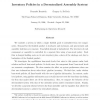Free Online Productivity Tools
i2Speak
i2Symbol
i2OCR
iTex2Img
iWeb2Print
iWeb2Shot
i2Type
iPdf2Split
iPdf2Merge
i2Bopomofo
i2Arabic
i2Style
i2Image
i2PDF
iLatex2Rtf
Sci2ools
IOR
2006
2006
Inventory Policies in a Decentralized Assembly System
We consider a system in which a single finished good is assembled from two components. Demand for the finished product is stochastic and stationary, and procurement and assembly leadtimes are constant. Unsatisfied demand is backordered. The inventory of each component or assembly is controlled by a separate firm using a base-stock policy. Each firm is charged holding costs on its own inventory plus a share of the shortage cost due to backorders of the finished product. We investigate the equilibrium base-stock levels that arise in this system under both echelon and local base-stock policies. In both cases, the component firms' base-stock levels are economic complements. We then examine the effect on system performance when one firm uses information about other firms' pipeline inventory. We find that, under echelon base-stock policies, all firms benefit with the use of pipeline information. In contrast, under local policies, using pipeline information may actually increase co...
| Added | 13 Dec 2010 |
| Updated | 13 Dec 2010 |
| Type | Journal |
| Year | 2006 |
| Where | IOR |
| Authors | Fernando Bernstein, Gregory A. DeCroix |
Comments (0)

